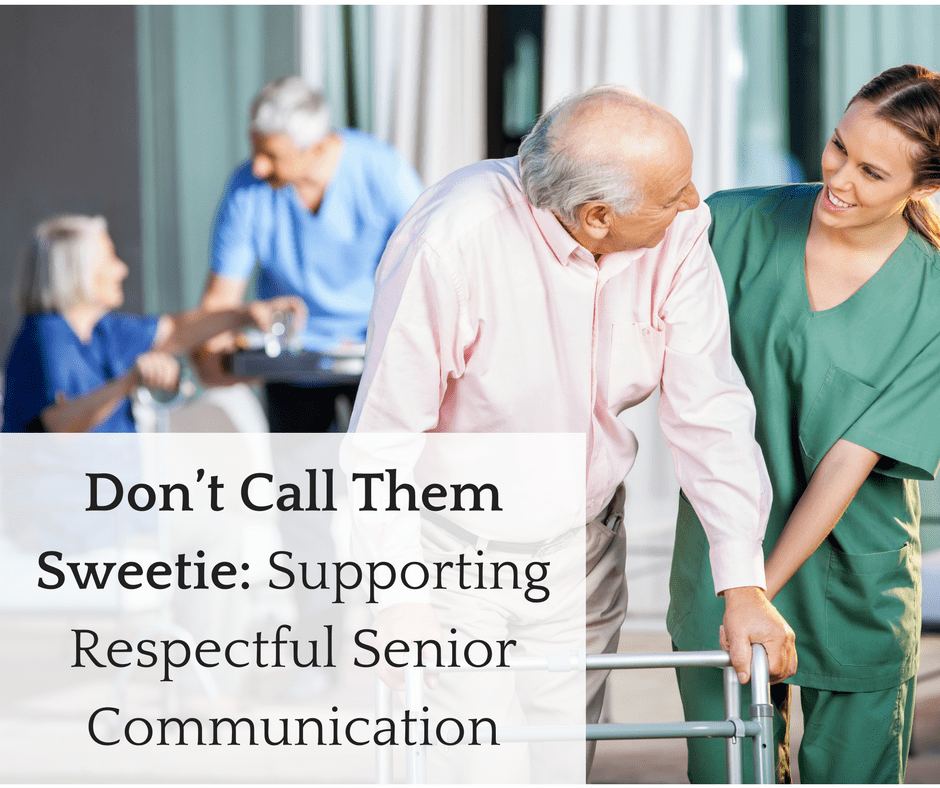Don’t Call Them Sweetie: Supporting Respectful  Senior Communication
Senior Communication
As Baby Boomers move into their senior years, many are running into an unpleasant fact. Too many people in our culture call seniors by nicknames like sweetie and dear instead of by their names. Older adults are calling out this behavior as demeaning and impolite, and doctors say pet names are a form of ageism that can cause stress and even harm seniors’ health. Here’s how you can find or build a community for your parents that supports respectful senior communication.
Ask questions and listen when you visit communities
When you’re checking out assisted living communities or nursing homes, ask staff members and managers what their policy is on calling patients by name and on the use of pet names like honey and dear. You can also ask residents, if they’re willing to talk to you, and you can listen to conversations in public areas to hear if the overall tone is respectful and personalized.
Set your expectations
Let the community manager and aides know what your parents want to be called, instead of putting your folks on the spot or leaving employees to guess. You can make it easy for busy staffers to remember by putting a nametag or a personalized photo frame near your parent’s bed and making a custom nametag for the door, if that’s allowed. You can explain that your parents do best when they feel seen and heard, and that pet names can be upsetting to them.
Lead by example
When you visit your parents, get to know the other residents and staffers in their community—and be sure you get in the habit of calling them by their names. Just as you want your mom and dad to be treated as individuals, their neighbors and caregivers want to be recognized, too. If your parents have memory or cognitive issues, help them put names to faces. This positive reinforcement can help strengthen your parents’ social ties and set standards for how they’re spoken to.
Advocate for parents with memory issues
Correct use of names is always polite, and it’s especially important for people with dementia and other memory and cognitive issues. Hearing their names can help connect people with dementia to their surroundings. Changes in the brain may cause the names your parents recognize to change as their condition progresses. If your parent suddenly prefers a different name (a nickname from childhood, for example), update the staff and management, and make new nametags and door signs.
Share your experiences
Let the aides and managers at your parent’s senior community know how much you appreciate their respectful communication with your mom or dad. Caregiving is a tough job and your positive feedback can mean a lot to these hardworking professionals. You might consider mentioning the attention to respectful communication when you leave a review of your parents’ community, too, to help other families who are searching for care.
Find the best senior living communities in the US, as chosen by families, on the SeniorAdvisor.com blog.
1 Comment
-
I really appreciated this article. It was well written and hit the nail on the head. I own an in-home care agency here in south Atlanta Georgia called Seniors Helping Seniors(r) it has always been an important part of our employee orientation/training that senior adults are very much still adults and deserve, even, need our respect which means treating them as adults and calling them by their given names or if they prefer Mr. or Mrs.
I will forward this article to each of my employees.
Thank you
Lewis Brannen
